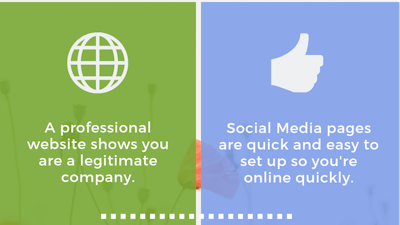
Being online is no longer a nice-to-have as a business owner – it’s a necessity. Today, you have so many options when it comes to giving your business an online presence. But what type of presence suits your business the best? And what type of medium will match the needs of your customers?
The endless options are usually cut down to two choices – a website or social media profiles.
The most common question asked is “what can a website do that social media can’t?” Social media has overtaken many other forms of marketing and communication online over the last decade. Many business owners wonder if a website is even needed now.
So, do you need a professional website to run a business, or will your social media accounts do the job?
Can a company survive on social media alone?
Social media comes in so many forms these days, and each profile only takes a couple of minutes to set up and get started. There are already millions of potential customers swarming Facebook, Instagram, LinkedIn, and other social media platforms, and this huge opportunity can be taken advantage of by your business in no time at all.
Read next: How to Promote Your Landscape Company on Social Media
Advantages
- Cheaper: Social media pages are quick and easy to set up, and business owners can usually set up accounts free of charge. This means a person can get a basic online presence started quickly with little effort.
- No Commitment: There is little or no commitment to your social media profile, and if a business owner no longer thinks the profile is doing the job they want it to, they can just delete it. Businesses can also just switch to another platform or have multiple social media profiles going at once – they are not stuck with one provider.
- Real-Time Customer Interaction: Social media enables and encourages back and forth interaction between businesses and their customers. It makes companies more approachable and human, which allows the business to easily communicate and build relationships with clients. Customers will learn more about a company's values and purpose as they read daily or weekly updates, and that same business will then be at the top of their list when they need to hire someone that does that type of work.
- Brand Loyalty: Interacting with a business on a daily basis will help create a sense of loyalty to your company and its way of doing business.
Read next: Do Online Reviews Really Matter?
Disadvantages
- Limited Customization: Social media platforms generally follow the same layout and leave little to nothing to be customizable. Yes, business owners can add a profile photo and company details, but there isn’t much they can do with the basic layout of the page. This limited design stops businesses from showing their originality and makes the page look exactly the same as everyone else’s.
- Open Forum: Consumers can ask questions and voice their opinions (feedback and possible complaints) on companies' social media pages. This means that someone must monitor the pages and keep a close eye on what the audience is saying. The public has complete control over what they comment on a business profile and can also link the company profile to a comment they are making on their own profiles.
- No Control: A lack of ownership is probably the number one issue when it comes to social media platforms. Small businesses don’t own their social media profiles. The social media sites control what content and promotions will be presented on the business pages, and owners must follow strict guidelines to keep their pages afloat. Companies could be building a strong social media presence for years and within an instant they could take it all away. Consider what would happen if the social media provider shut the site down and ruined a company's online presence. Especially if that was the company's only online presence. While it’s difficult to imagine a world without Facebook, there have been plenty of other social media sites that have been incredibly popular before disappearing into the mists of time, such as Myspace or Bebo.
Do companies need a website?
If a small business owner wants complete control over the company’s authority online, then a website is the better choice over only having social media profiles. It's important to note that a well-laid-out digital strategy will include both a professional website and regularly updated social media accounts.
Read next: Landscape Business Website Design Tips
What’s great about a website is that it belongs to the company. Owners decide where it goes and what it looks like, and it provides an unbeatable level of credibility for the business. A website can be as simple or as complex as you want. Customers want to put their trust in a business that looks professional, and a website can help achieve this.
Advantages
- Credibility: Websites are an important way to demonstrate the legitimacy of a company. People expect companies of all sizes to have an up-to-date, mobile responsive website. People will put more trust in a business if it has its own site – and trust is essential before they hand their hard-earned cash over to a company they’ve never worked with before. In 2018, 64 percent of small businesses obtained a website. Of those, 94 percent were expected to make them mobile-friendly this year.
- Controls: When a business has a website, it owns it. The owner has full reign over how it looks and what features are displayed on it.
- More Marketing Opportunities: Through a website, businesses have an opportunity to create better marketing campaigns. There is more freedom to communicate and sell to customers. At its core, a website is a space to market a business through use of videos, blogs, customers feedback and even some promotional offers. Other options include pay-per-click campaigns which are used to drive traffic and the advertiser pays a publisher when the ad is clicked. Sending clicks to a business homepage is a waste of money. Once people land on the homepage, they have no idea what to do next. Having a website allows business owners to create a custom landing page to direct all paid-for traffic to. This means they are able to target specific audiences with specific services and have a much higher chance of turning them into customers.
- Full Availability: Websites are available for customers 24 hours a day. Many customers now prefer to get information about a business online, and if they have a website full of all their information it makes it easy for customers to get in contact. Having a website full of helpful information about the company, as well as contact information can seriously reduce the amount of time spent answering common questions.
Disadvantages
- Maintenance: Depending on how big a company's website is and what content management system it’s built on will dictate how much time and effort it will take to maintain. It’s important to maintain a website at all times from both a security point of view and a customer point of view; and this can become quite a time-consuming task.
- Websites Cost Money: No matter who you choose as your website developer, it’s going to cost money. For the love of all things professional, do not get a free website. Customers will know when a company has not paid a penny for its website, and they’ll make their own judgements about the company's choices and why they were made. It might even cost the company some potential business. Cost ranges widely from $500 to $100,000 or more depending on what the business is looking for.
- More Time, More Effort : Business owners have to make more of an effort with websites in regard to effective marketing. To get people to find a company's site and get Google recognizing it takes time and patience. To achieve this takes a lot of planning and a marketing strategy implemented to get a website to fuel company sales.
Who’s Taking Home The Win?
When it comes to what’s best for your business, only you can make the final decision on how you present yourself online. Whether you choose to solely rely on social media for your business or you decide to create your own website is your decision. Based on the advantages and disadvantages of both you will probably be thinking that a website is vital for your business. Even if a business is small and growing a website can help eliminate some of the growing pains.
Social media shouldn’t just be forgotten about, though. It is an incredibly powerful tool to help you run your business. It helps you engage with customers, share new products/services and bring visitors onto your website.
An effective digital strategy combines the professionalism of a website as well as multiple social media profiles to give your business what it needs to grow and flourish online.



















